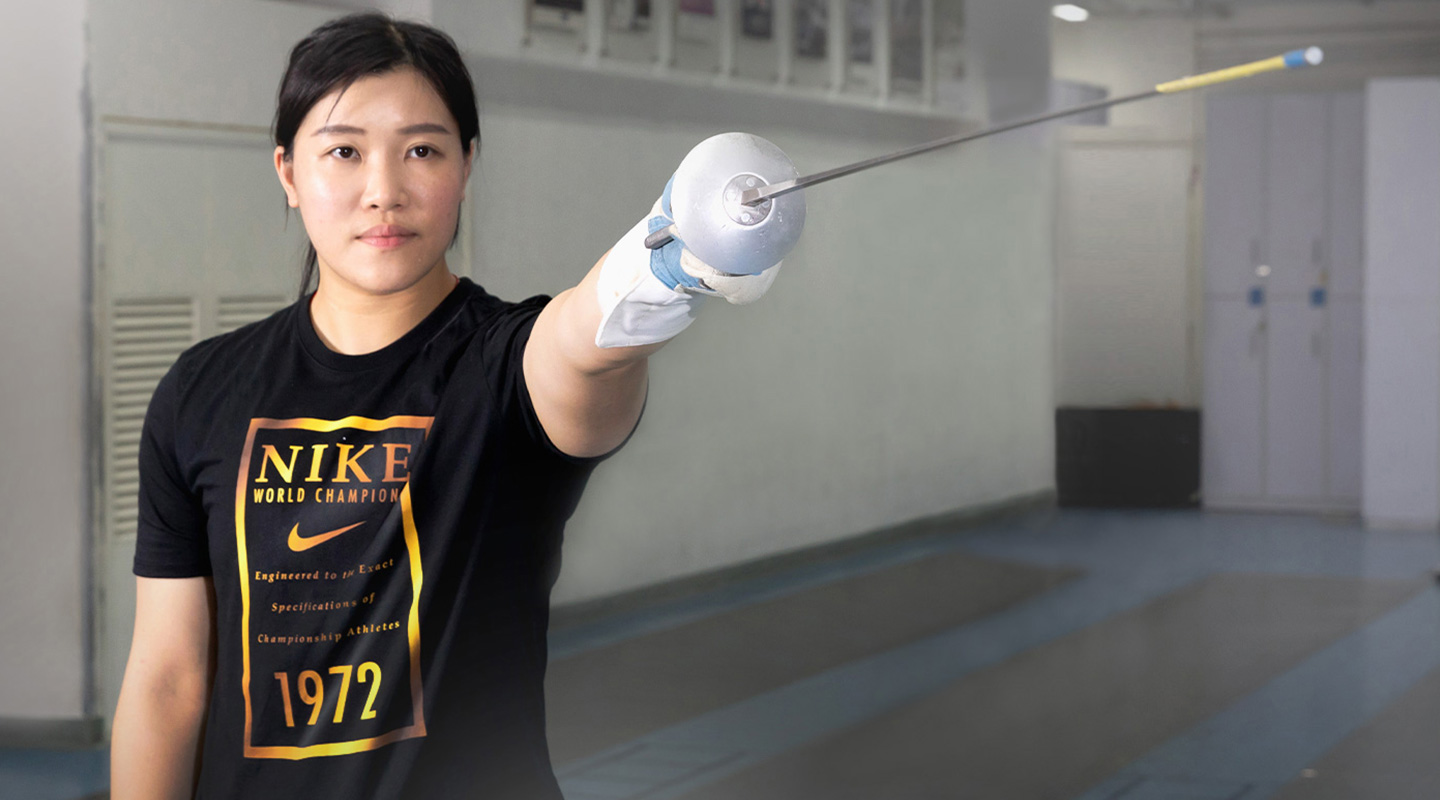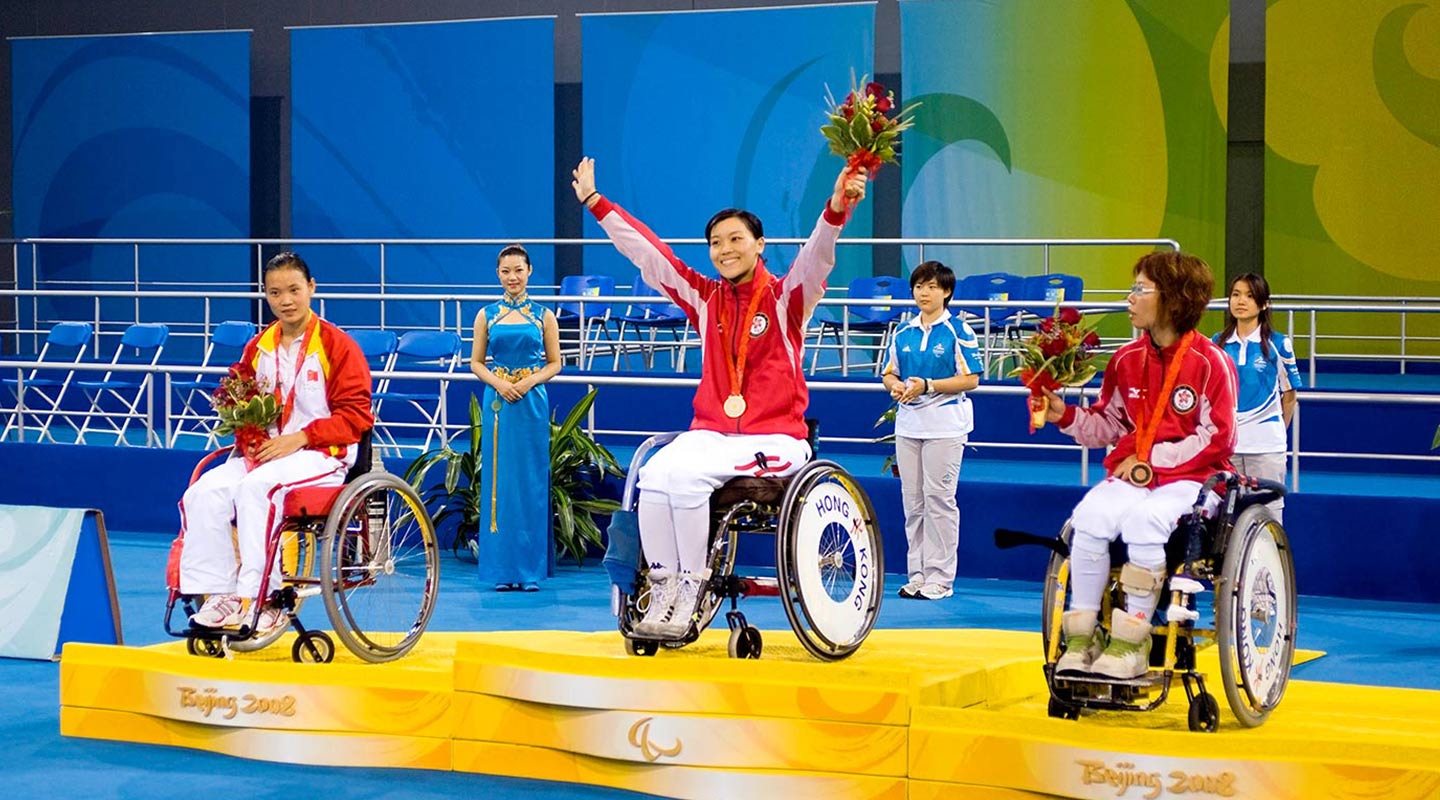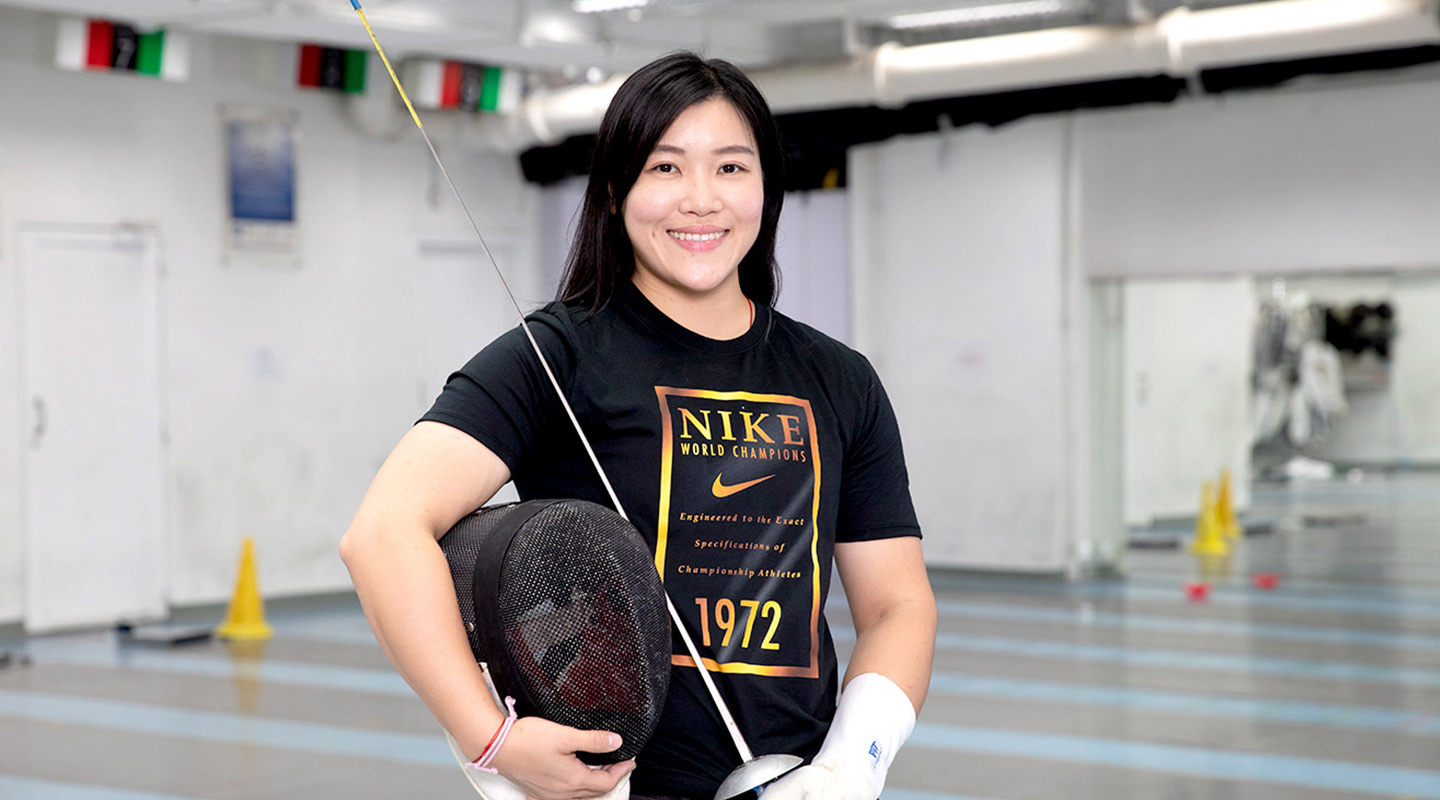Dear readers, With the launch of e-newsletter CUHK in Focus, CUHKUPDates has retired and this site will no longer be updated. To stay abreast of the University’s latest news, please go to https://focus.cuhk.edu.hk. Thank you.
Crossing Swords with Fate
Alison Yu conquers the unconquerable

Alison Yu Chui-yee, a fencer with seven Paralympic gold medals under her belt, wears many hats—radio show host, columnist, and founder of an academy of fencing. Also an avid swimmer in her leisure time, she has recently started running and is even planning to take up scuba diving and paragliding. One cannot help but be amazed that, rather than being hampered by her physical disability, she has managed to realize more possibilities.
Diagnosed with bone cancer at the age of 11, Alison fully recovered after having her left cancerous shin bone replaced and returned to school as a Primary Five repeater. As luck would have it, the newly-implanted shin bone was fractured from an injury during a PE lesson. Given the persistent inflammation, the wound had to be washed every day and with her leg plastered, she had to rely on crutches. Six months later there was still no sign of improvement. Despite her young age, she decided to have her leg amputated.
On hearing this, one may want to pay her a compliment. She would, however, immediately shrug it off: ‘As a kid, I didn’t think too much. It was such a hassle to wash my wound every day, so I might as well have the leg removed and get a prosthesis. That would make it easier for me to get around to play.’
To learn how to walk with the prosthesis fitted, initially she had to use crutches for support. What made her feel most uneasy was not so much her own disability but the way people looked at her. Yet she soon talked herself out of it. ‘Sensitive people will always find something to be sensitive about. They could even mind that they’re too perfect! I must be able to accept myself before I can expect to be accepted by others.’
She took to swimming so as to strengthen her physique. Through a friend she made in the swimming class, Alison enrolled in a fencing programme. After learning the sport for half a year, she was spotted by the coach of the Hong Kong fencing team. The invitation to receive training at the Hong Kong Sports Institute paved the way for her to become a wheelchair fencer.
Did she feel she was a particularly gifted fencer? ‘I think it has to do with my character. I am very competitive and I savour the moment of victory. Even when playing a video game, I will go all out and do my best. So, even for a different sport, I have the confidence to excel in it.’ Thanks perhaps to her training in fencing, Alison’s responses were always to the point, invariably giving the impression of being self-assured, sparkling and headstrong.

In 2004, as a Form Seven student, she represented Hong Kong for the first time to participate in the Athens Paralympics, making a splash by winning four golds in wheelchair fencing. In the following year she gained admission to CUHK’s Department of Geography and Resource Management, and went on to obtain an MA in Sports Studies. Shuttling between the University campus and the Hong Kong Sports Institute for five consecutive years, she did not find it hard at all. ‘It’s just a matter of time allocation. Nothing worth mentioning.’
Her innate optimism has won her a good number of friends. The Beijing Olympics coincided with her third-year studies at CUHK. She could still recall vividly that, on the day of the torch relay in Hong Kong, many of her classmates showed up in Nathan Road to root for her as one of the torch bearers.
Having taken part in four Olympic Games, she has bagged a total of 11 medals, the highest number among Paralympic athletes in Hong Kong. Was there any pressure from such outstanding achievements? ‘Whenever I’m competing, I never think about my past performance. I just focus on the present, doing my best with every thrust of my sword. As long as I take care of the process, the result will take care of itself.’
Alison went on to share the philosophy that had dawned on her in the sports arena: ‘When competing against players from around the world, those who care about winning most will make the cut. But when it comes to the championship match, the winner is always the one who cares the least and is best at letting go. Only with the right balance of mindset can you become a top athlete.’
Now in her early thirties, her idol is tennis superstar Roger Federer. While physical fitness declines with age, an athlete’s skill, tactics and willpower can still be improved with experience.

Fencing changed Alison’s life for the better, and she was looking to promote the sport to the community. In 2013, she co-founded with her friends the Fencing Sport Academy for young children and teenagers. She said she did not expect all her students to become professional athletes, but instead hoped that they would learn how to ‘fail’.
‘Kids these days are often said to have low personal resilience. Indeed they seldom experience adversity in life, but can we blame them? Fencing is a one-against-one contest. There is a winner and there is a loser. Learning to fence is about learning to face success and failure and to accept that failure is inevitable.’
When asked about how she coped with the new challenge of starting a business, she once again demonstrated her proactive nature. ‘You’ve got to embrace all sorts of challenges throughout life. From having to go home for lunch after half-day primary classes to having to sort out lunch once you start secondary school, aren’t they all challenges? Challenge isn’t something you can refuse. Refusing challenges implies elimination.’
Alison had a difficult start in life but is getting better and better. Is she ‘gratified’ that her losses have in fact turned to gains? Her answer was incisive: ‘I won’t go into what would have happened had I not had my leg amputated, or not taken up fencing for that matter. It doesn’t matter anymore. The important thing is I made a decision. I’m responsible for it and so I have to make sure that I make the right moves for the future.’
Alison’s story echoes the proverb that when life gives us lemons, make lemonade. What life throws at us could be a blessing or a curse. It all depends on how we seize every moment and how we make of it.

Reported by Christine N., ISO
Photos by Eric Sin
This article was originally published on CUHK Homepage in Sep 2018.